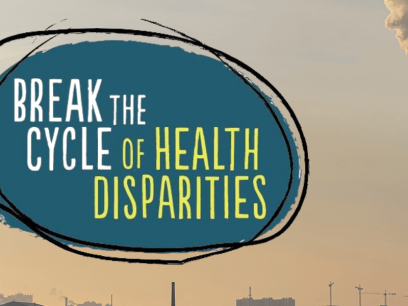
Regular walking can have a tremendous positive impact on overall health and well-being. There are additional benefits in taking these walks in natural environments, such as parks, trails, and other green spaces. Studies have shown that people are more likely to walk and be physically active, as well as enjoy higher levels of health and well-being when they have easily accessible green spaces in their communities.
Walking in nature promotes total health, both physical and mental. An example of this can be seen by looking at the body’s relationship with stress after walking through an urban and a green environment. In one study, groups of university students were taken on walks through a forest and the city. Saliva samples taken from the participants before and after each of the walks demonstrated that the experience of walking through the forest reduced the participants’ levels of cortisol, the body’s stress hormone, to a greater extent than did the city walk.1 These results were echoed in a study where researchers looked at EEG readings of participants as they walked through a shopping district, a leafy green area, and then a busy commercial site. The brain activity recorded on this walk demonstrated a reduction in tension and stress as the participants entered into the natural area, coupled with increased levels of calm and relaxation.2 Thus, by intentionally getting exposure to nature during their walk, the participants had lower levels of stress, both physical and mental, than they experienced by walking through more developed areas.
Walking in nature can have additional positive impacts on disposition and memory—researchers have found that students with moderate to severe depression demonstrated a significant increase in both mood and short-term memory after a walk through a natural setting, as compared to a walk through the city.3 For children with ADHD, a walk through a park, compared to walks of equal length through a neighborhood and an urban setting, had the greatest success in improving the attention span of the children on frustrating tasks.4 Spending time walking in nature also stimulates mental acuity—individuals who spent time backpacking through the woods without access to technology demonstrated improved ability in creativity and problem solving.5
For those looking to start a regular exercise routine, the regimen might be more likely to last if done outdoors: people who are regularly exposed to a natural environment may be more likely to participate in moderate-to-vigorous physical activity,6 and those who exercised outdoors as opposed to inside on a treadmill reported a greater intent to repeat their routine.7
Walking is greatly beneficial for the body and mind. Taking the exercise out into nature augments these benefits, so that getting to better health may be just a walk in the park.
Sources:
1 Park B, et al. (2009). Environmental Health and Preventative Medicine; 15:18–26. doi: 10.1007/s12 199-009-0086-9
2 Aspinall P, et al. (2013). The urban brain: analyzing outdoor physical activity with mobile EEG. British Journal of Sports Medicine. 0:1-6. doi: 10.1136/bjsports-2012-091877
3 Berman MG, et al. (2012 Interacting with nature improves cognition and affect for individuals with depression. Journal of Affective Disorders. 140(3):300-5. doi: 10.1016/j.jad.2012.03.012
4 Taylor AF, Kuo FE. Children with attention deficits concentrate better after a walk in the park. Journal of Attention Disorders. 2009;12(5):402-409. doi: 10.1177/1087054708323000
5 Atchley RA, et al. (2012). Creativity in the wild: improving creative reasoning through immersion in natural settings. PLOS ONE. 7(12):e51474. doi: 10.1371/journal.pone.0051474
6 Astell-Burt T, et al. (2013). Green space is associated with walking and moderate-to-vigorous physical activity (MVPA) in middle-to-older-aged adults: findings from 203,883 Australians in the 45 and Up Study. British Journal of Sports Medicine. 2013; 0:1-4. doi: 10.1136/bjsports-2012-092006
7 Coon JT et al. Does participating in physical activity in outdoor natural environments have a greater effect on physical and mental wellbeing than physical activity indoors? A systematic review. Environmental Science and Technology. 2011. doi: 10.1021/es102947t


